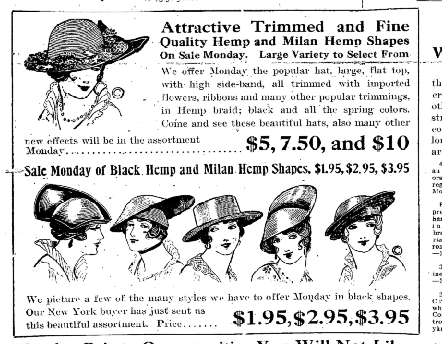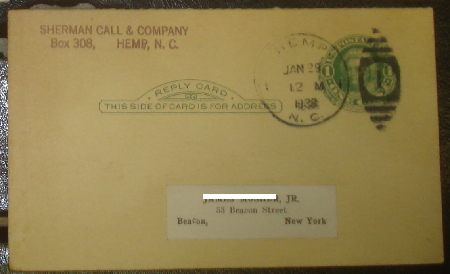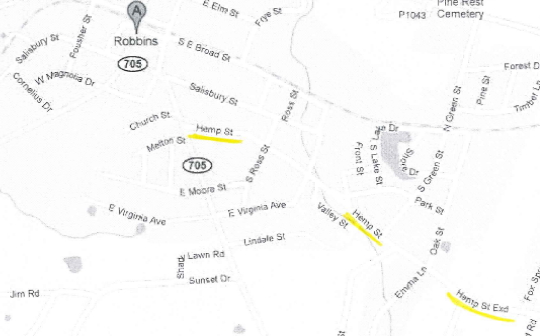
|
Chapter 4 - (2nd Edition) North Carolina -- Industrial Hemp |

|
|---|
in
NORTH CAROLINA:

According to the North Carolina Museum of History: Website: -- http://ncmuseumofhistory.org/nchh/eighteenth.html
- 1650 - “White settlers begin to move into Indian lands along the coastal sounds and rivers of North Carolina.”
- 1705 - “Parliament passes the Naval Stores Act in an effort to cut British dependence on foreign sources of tar, pitch, and other commodities badly needed for sailing ships. The act subsidizes the production of naval stores in the colonies by paying premiums of four pounds sterling per ton on tar and pitch, and six pounds per ton on hemp. North Carolina benefits substantially from this act, and the production of naval stores becomes one of the coastal area’s prime industries.”
- 1791 - “. . . . Flax and hemp are important in the economy of backcountry farms. . . . . ”
HEMP IN NORTH CAROLINA
“Like many southern states, North Carolina at one time grew hemp. There is record of 39 tonnes grown in 1850 and 3,016 tonnes grown in 1860. The Civil War was a factor which stopped much of the US hemp cultivation, so the 1870 record is nil. That same amount is what is grown today . . .”
Hemp, North Carolina
Today Hemp, North Carolina is known as the Town of Robins, North Carolina.

According to the cities own website: http://www.townofrobbins.com/index.php?option=com_content&view=article&id=60&Itemid=69
“In 1935, the Town’s name was changed again. The name was changed to Hemp, to avoid confusion between Elise and another town in North Carolina which had a similar name. Karl Robbins brought great prominence to Hemp. He was directly responsible for a modern water treatment plant and a wastewater disposal system being completed in 1937. He also provided for recreational facilities and a baseball park. Mr. Robbins did many other things, too numerous to mention, for the Town of Hemp.Which begs the obvious question - Are we to presume that the Reefer Madness hysteria campaign (still going on at the time) had nothing to do with the name change?
In honor of Karl Robbins, grateful for all he had done, the citizens of Hemp changed the name of the Town that was Mechanics Hill, then Elise, then Hemp, to Robbins. The Town officially became Robbins in 1943, by act of the General Assembly.”
However, while in North Carolina, the author spent numerous hours going over their N.C. State Archives (Raleigh N.C.) and found no evidence to suggest anything sinister. ---- Granted, everyone loves a good conspiracy theory, but unless new facts are introduced, the facts here seem to imply that the town simply changed its name in honor of its leading citizen.
According to “The State - A weekly survey of N.C.[2] Magazine (through the generosity of Mr. Robbins):
- During the worst part of the depression (due to the Mil), Hemp was looked upon as a ‘Boom town’.
- He put $2,000 into equipment for (a playground and provided for its maintenance).
- $10,000 in a fine baseball park - (with) locker rooms, washrooms etc.
- Tennis courts,
- Whenever schools have needed special help, such as during times when the boilers or water systems were giving trouble . . .
- When churches have needed repairs the mill has usually . . volunteered financial aid
- . . . gifts of food to all needy . . .
Even the public records seem to show as much. And here it should be noted that there was a group of people who DID NOT WANT to change the name and they fought against the petition to do so (lawyers, legal briefs, letters of complaint, etc). However, none of the documents give any indication that the Reefer Madness campaign had anything to do with it.
In addition, many of the dubious questions, brought out during the legal hearings on the matter had legitimate answers: Examples:
- That Carl (Karl) Robins was a German Citizen (we were at war against Germany at the time). - This turned out to be technically incorrect. As a young man his father became a U.S. citizen and thus he automatically became one too.
- The fact that Carl Robins was not even a resident of Hemp, N.C. -- That didn’t matter, he owned the local Hemp/Cloth mill, and this was a company town etc.
And as sadly as it seems, the once proud name of Hemp, was changed to Robbins, N.C. However, as this Google Earth map shows, the History of Robbins, N.C. remains alive:

And a Proud History It Is.
============
FOOTNOTES:
[1] -- http://www.hempforvictory.blogspot.com/2006/07/hemp-in-north-carolina-like-many.html
[2] -- Changing the Name of Hemp. (1943, September 4). The State, A Weekly Survey of North Carolina, pp. 15-21.
WANT TO KNOW MORE:
=====================
Due to space / download time considerations, only selected materials are displayed. If you would like to obtain more information, feel free to contact the museum. All our material is available (at cost) on CD-Rom format.
CONTACT PAGE
 BACK TO North Carolina MAIN PAGE |